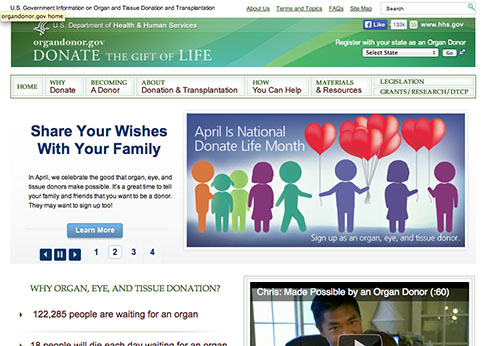When I was about 8 years old, I wrote my first “official” will and testament. I wasn’t in immediate danger of death, but just in case, I wanted to make suremy parents knew exactly who should get my Walkman and cassette tape collection. What I didn’t realize was that my most valuable possessions weren’t even in my will–they were in my body.
Adding your name to the organ and tissue donor registry is kind of like writing a will for the estate that is your body. It allows you, in death, to pass on the gift of health, sight and life to people in need.
According to Lifesharing, the organization managing the donor registry in San Diego, each organ donor touches the lives of many. One donor can offer life-saving organ transplants to as many as eight recipients, and tissue, bone and corneas can be given to enhance the lives of another 50. Don’t forget–along with each recipient come friends and family members who also receive a in the form of a healthy brother, father or best friend.
The great thing about organ donation is that almost everyone is eligible to become a donor. The problem is, not enough people register. According to Claire Acey, communications manager for SightLife, a cornea donation network, only 35 percent of Californians are registered donors.
Sharon Ross, Lifesharing’s director of public realtions and community outreach, said myths about organ donation often lead people to rule themselves out of registering for the wrong reasons.
April is National Donate Life Month, and in light of that I think it’s time we debunk some of these myths that stop people from becoming donors so we can all make informed decisions for ourselves about this important issue.
Lifesharing advisory board member Christy Heymann shared the three most common misconceptions about organ donation.
Myth #1 If I’m an organ donor, doctors won’t work as hard to save my life.
Of course they’re going to try to save your life. That’s what doctors are there for. According to Heymann, in most cases, the hospital team doesn’t even know whether or not you’re a donor. It isn’t until after death that the registry is consulted and organs are evaluated for possible transplant. Even then, two separate physicians who are not affiliated with the transplant must certify brain death before organ procurement is even considered.
Myth #2: If I donate my organs and tissue, I won’t be able to have an open casket funeral.
Organ donation does not effect funeral arrangements at all. Organs are recovered surgically with the care and precision that is expected of all surgeries.
“We consider our donors heroes, and respect their body as such,” Heymann said.
Skin or tissue donations are taken from the back of the body to preserve the appearance of the donor. An open casket funeral is definitely still an option.
Myth #3: My organs are probably no good anyway because of my lifestyle/age/health problem/etc.
Nope. Everyone is eligible to register as a donor. When the time comes, each donor is medically assessed for transplant viability and sometimes, successful donations come from the most unlikely donors. According to Ross, a donor blinded by diabetes was able to give the gift of sight to a recipient through the donation of healthy corneas.
Organs are only part of the story. Donations of skin, bone and tissue help in important ways, such as closing serious wounds and allowing people walk to again. Eighty-five percent of donors can make successful tissue donations, helping up to 50 people in the process.
There are currently more than 120,000 people waiting for transplants in America; one-in-five of them live in California. In San Diego County alone, 80 people died last year waiting for an organ donation that never came.
Bringing your organs to the grave with you makes as much sense as ancient Egyptian Pharaohs being buried in tombs full of treasure. Nevertheless, people do it every day. It’s simply wasteful.
You can be part of the solution to this problem. Take the time to get educated about this not-so-sexy but very important topic. Once you’re informed, talk to your friends and family about registering as well.
Ensure your last act on this planet will be a heroic one rather than a selfish one. Visit donatelifeca.org and register to become an organ and tissue donor today.







